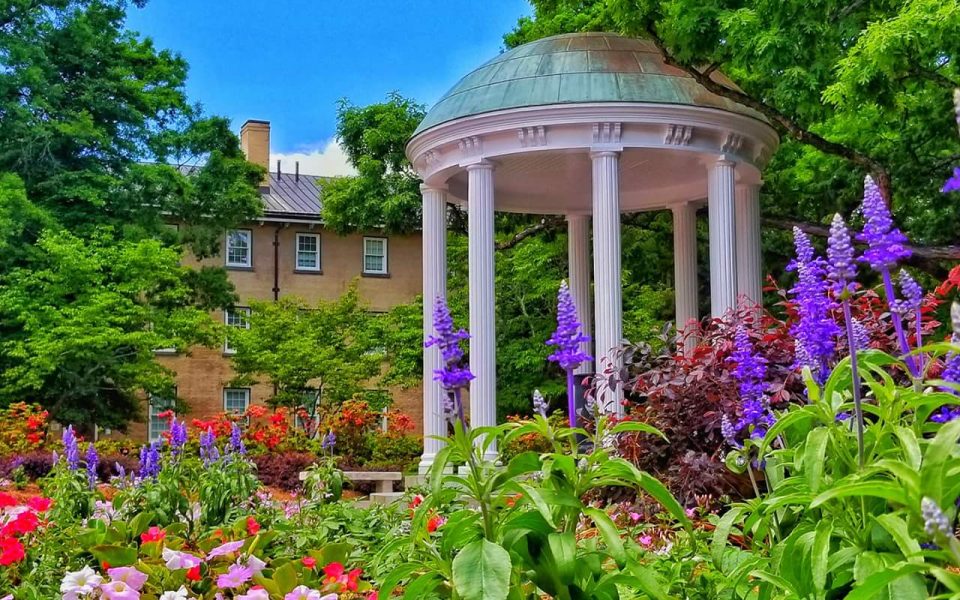Featured photo: The Old Well on UNC Chapel-Hill’s campus. (photo by Jack a lanier, CC BY-SA 4.0 https://creativecommons.org/licenses/by-sa/4.0, via Wikimedia Commons)
I grew up in the northern part of Greensboro, off of Horse Pen Creek Road back before the Harris Teeter was ever there and trees buffered the sound from the nearby airport. The area was quieter then, with little more than a few churches, some neighborhoods and the Spears YMCA on our street.
Both my sister and I were zoned for Summerfield Elementary School, Kernodle Middle School and Northwest Guilford High School, which were all of the schools that we attneded from elementary through 12th grade. And it was rare, as a Japanese-American kid, to see other East Asian kids in those schools.
When I got to UNCG in 2010, I became lifelong friends with my roommate and became closer to my friend from high school; the two are still my closest and dearest friends. And although I love them as sisters, as white women, there are things that I sometimes feel I can’t express to them in the same way I might be able to with other POC.
Four years later, when my sister attended UNCG, her experience was vastly different. She had gone to the same schools, faced the same whiteness of the institutions and made the conscious decision to surround herself with not only POC friends, but specifically other Asians. She joined the Filipino American Student Association on campus, which as I understood it, was really just a blanket group for all kinds of Asians to find camaraderie. And because of the relationships and the dynamics that she immersed herself in all those years ago, she continues to have close Asian friends in a way that I do not.
It’s something that I often think about now, and how I wish I had more Asian friends. There’s a certain comfort and familiarity with surrounding yourself with people who look like you. I’m not advocating for racial isolation, of course. But there is something to be said about the ease of not having to explain yourself or having common experiences that make you feel seen.
And by repealing and replacing its Diversity, Equity and Inclusion policy on Thursday morning, the UNC Board of Governors just made it more difficult for POC students, LGBTQIA+ students and others who are often marginalized to find comfort on campuses.
The move, which has been in the works for months, follows national conservative trends against DEI and other “woke” policies seen as detriments to society by right-wing politicians.
According to the Chronicle of Higher Education, 85 anti-DEI bills have been introduced nationwide since 2023.
And while the new UNC policy would not eliminate student organizations like FASA, the move sends a clear message to students, faculty and staff who care about diversity and inclusion on NC campuses: We don’t care about you.
Because of its new policy, all 17 institutions within the UNC school system will have to either change or eliminate their DEI programs. According to the News & Observer, the policy’s language indicates that diversity-related jobs, programs and other efforts “will likely be eliminated or changed to remove their direct ties to DEI.”
I’m here to tell you that this is going to hurt so many students.
Studies and data has shown time and time again how important DEI efforts and programs are for a vast number of students.
According to one study published in the Journal of Diversity in Higher Education in 2019, researchers found that the presence of DEI offices and DEI plans increased the enrollment of diverse students, increased overall job satisfaction for staff and found that ethnic minority students felt that the institution valued diversity more.
In fact, DEI programs and offices are so important at higher education institutions that more than half (55 percent) of the students surveyed by BestColleges.com said that they would consider transferring if their college were to abolish DEI initiatives. That percent was higher for Hispanic students, LGBTQIA+ students and Black students. A different survey by Hanover Resarch found that 88 percent of students interviewed supported funding DEI programs.
So not only is the UNC Board of Governors putting the mental and emotional well-being of so many students on the line with this change in policy, it’s also potentially shooting itself in the foot for admissions to its institutions. No matter how you look at it, this policy is dangerous and short-sighted, and the board should be ashamed of itself.
Join the First Amendment Society, a membership that goes directly to funding TCB‘s newsroom.
We believe that reporting can save the world.
The TCB First Amendment Society recognizes the vital role of a free, unfettered press with a bundling of local experiences designed to build community, and unique engagements with our newsroom that will help you understand, and shape, local journalism’s critical role in uplifting the people in our cities.
All revenue goes directly into the newsroom as reporters’ salaries and freelance commissions.


Leave a Reply